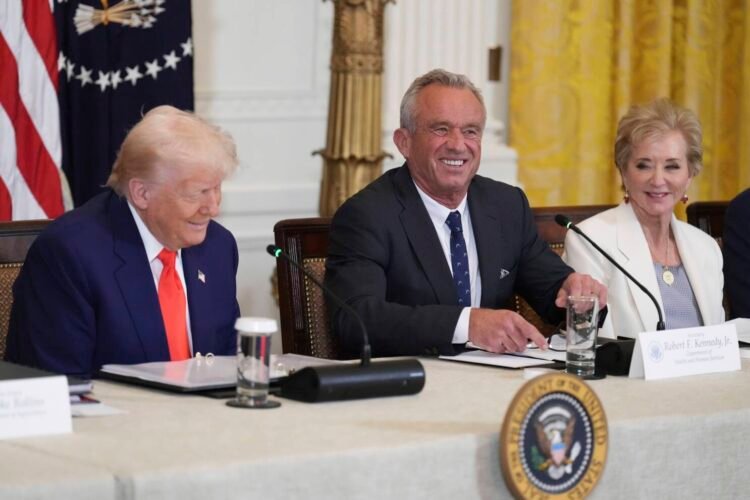“compiled:Sophia Bennett”
Robert F. Kennedy Jr.’s high-profile “Make America Healthy Again” (MAHA) report — unveiled earlier this year as a cornerstone of his agenda as Secretary of Health and Human Services — is now facing serious credibility questions after journalists and researchers revealed that several key studies cited in the report either don’t exist or were grossly misrepresented.
According to a joint investigation by Notus, The Guardian, and the BBC, at least seven studies cited in the 73-page document cannot be verified. Researchers named in those footnotes say they were either misattributed or falsely included, fueling accusations that the administration is pushing policy with fabricated science.
Ghost Citations and Phantom Footnotes
Touted as a “gold-standard” report that would reshape America’s response to chronic illness — particularly in children — the MAHA document promised over 500 scientific citations. But investigations found glaring red flags:
-
Several citations linked only to the report itself, not to any peer-reviewed publication.
-
A cited study by ADHD researcher Robert L. Findling could not be located, and his university confirmed no such work exists.
-
A supposed paper co-authored by pediatric asthma expert Dr. Harold J. Farber was confirmed by Farber himself to be fictional.
“It does not exist. I never wrote it. I don’t know the co-author,” said Columbia professor Guohua Li, who was also falsely listed as a contributor to another citation.
Scientists Speak Out
Other researchers named in the report have publicly denied any involvement:
-
Katherine Keyes, an epidemiologist, said she was falsely listed.
-
Joanne McKenzie, a statistician, said the MAHA report twisted her findings, mislabeling a study on drug efficacy as one about talk therapy.
-
Mariana G. Figueiro, a sleep researcher, said her study — inaccurately cited as about children — actually involved college students and was published in an entirely different journal.
“There’s no question,” said McKenzie, “this is not just a formatting error. It’s scientific fraud.”
The White House Response: ‘Formatting Issues’
In response to growing criticism, White House Press Secretary Karoline Leavitt downplayed the controversy, framing the incorrect citations as “formatting issues.” She insisted the report’s “substance remains valid,” although no clarification or retraction has been issued by the Department of Health and Human Services (HHS).
The Democratic National Committee was more forceful, accusing the Kennedy-led HHS of “justifying policy with sources that do not exist” and “misstating conclusions to fit a political agenda.”
Kennedy’s War on Medical Journals
The controversy is unfolding against the backdrop of RFK Jr.’s public battle with mainstream science. Days before the scandal broke, Kennedy accused leading journals such as The Lancet, JAMA, and the New England Journal of Medicine of being “corrupt” and beholden to pharmaceutical interests. He proposed replacing them with government-run publications, raising alarms among researchers who say such a move could end scientific independence.
Since his controversial confirmation in January, Kennedy has already launched sweeping changes at HHS — including plans to require placebo trials for all new vaccines and eliminate what he calls “regulatory capture.”
The Gray Area: Policy Proposals with Real Merit
Despite the scandal, some experts argue that the MAHA report contains valid and important ideas. A University of Pennsylvania review found that many of its food and nutrition policies are backed by legitimate science.
Proposals such as:
-
Cutting subsidies for sugary drinks
-
Expanding nutrition services in healthcare
-
Reducing toxic food additives
…are seen as grounded and potentially transformative.
“This is a solid food policy framework,” said Dr. Dariush Mozaffarian of Tufts University. “The flawed citations don’t negate the entire roadmap.”
Jerold Mande, a former FDA official, agreed: “If you separate the bad footnotes from the good ideas, you actually get something promising.”
What Comes Next?
A second installment of the report, “Make Our Children Healthy Again,” is due in August — now under far more intense scrutiny. Critics say Kennedy’s credibility is on the line.
With his administration pushing reforms that challenge decades of medical consensus, the central question remains: Can public health policy be trusted when its scientific foundation is crumbling?
As one anonymous NIH official told The Guardian, “You can’t fight chronic illness with fake footnotes.”

 English
English



























































